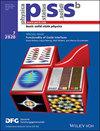二维材料的尖端增强拉曼光谱相干长度:石墨烯的应用
IF 1.8
4区 物理与天体物理
Q3 PHYSICS, CONDENSED MATTER
引用次数: 0
摘要
本文介绍了一种确定石墨烯两个主要拉曼光谱带的尖端增强拉曼光谱 (TERS) 相干长度 (Lc) 的方法。该方法包括执行接近曲线实验,并绘制 G 波段和 2D 波段的归一化面积与针尖-样品距离的函数关系图。使用特定的 TERS 公式对所得数据进行拟合,以提取 Lc。结果表明,石墨烯中 G 和 2D 波段的相干长度分别为和 nm。虽然该方案是专门针对石墨烯设计的,但基于模式对称性的基本理论框架可以扩展到其他二维材料,如过渡金属二卤化物。这证明了 TERS 在探索各种二维材料相干特性方面的多功能性和潜力。本文章由计算机程序翻译,如有差异,请以英文原文为准。
Tip‐Enhanced Raman Spectroscopy Coherence Length of 2D Materials: An Application to Graphene
Herein, a protocol is presented for determining the tip‐enhanced Raman spectroscopy (TERS) coherence length (L c ) of the two main Raman bands of graphene. This method involves performing approach curve experiments and plotting the normalized areas of the G and 2D bands as a function of tip–sample distance. The resultant data are fitted using a specific TERS formula to extract L c . The results indicate different coherence lengths for the G and 2D bands in graphene as and nm. While this protocol is specifically done for graphene, the underlying theoretical framework, based on mode symmetry, can be extended to other 2D materials, such as transition metal dichalcogenides. This demonstrates the versatility and potential of TERS in exploring the coherence properties of various 2D materials.
求助全文
通过发布文献求助,成功后即可免费获取论文全文。
去求助
来源期刊
CiteScore
3.30
自引率
6.20%
发文量
321
审稿时长
2 months
期刊介绍:
physica status solidi is devoted to the thorough peer review and the rapid publication of new and important results in all fields of solid state and materials physics, from basic science to applications and devices. Being among the largest and most important international publications, the pss journals publish review articles, letters and original work as well as special issues and conference contributions.
physica status solidi b – basic solid state physics is devoted to topics such as theoretical and experimental investigations of the atomistic and electronic structure of solids in general, phase transitions, electronic and optical properties of low-dimensional, nano-scale, strongly correlated, or disordered systems, superconductivity, magnetism, ferroelectricity etc.

 求助内容:
求助内容: 应助结果提醒方式:
应助结果提醒方式:


